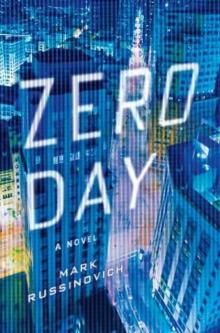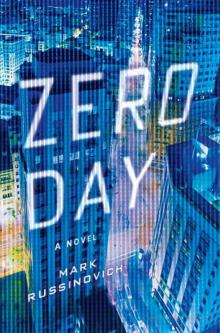- Home
- Mark Russinovich
Zero Day: A Novel Page 18
Zero Day: A Novel Read online
Page 18
For u stuff? Seems like a lot …
Dante:
I’m nt laughing.
Godder:
Wht d thy py t most for?
Dante:
I speed up loading time. Othrs sell packages and triggers.
Godder:
What kind of triggers? I’ve gt sm of thos …
Dante:
Clock related bt sum othrs 2 …
Godder:
Wht packages:
Dante:
U know … like sp@ts …
Godder:
Who’s he?
Dante:
He’s nt bin around fr …
Saintie:
He’s down now … too much heat …
Dante:
… awhile. Thanks. Don’t b stupid Godder. Wht kind packages d u think I mean? All kinds … Nastier t better … Thy like it bad … as in BAD … One guy’s makng a killing with rootkits … But thy dnt want nomore.… Superphreak’s gt a lock on that market …
Jeff felt the hair on his neck bristle.
Godder:
I’ve got some stuff like that other … Where t?
Dante:
Give me an address n I’ll snd it.
Godder:
Send me an email fr u at [email protected]. I’ll snt it to u.
After that Godder disappeared, as did Dante. Jeff considered posting a message but decided against it. Better to watch and learn. He opened his ICQ and saw Daryl was online. He typed:
JA33: Y arn’t u n bed?
There was a long pause before she answered.
D007: Wt a sec.
Then she wrote:
D007:
Srry. Hd t finish sumtng. Wht’s up?
JA33:
No luck. Thnkng abt tllng t guy I cn’t help him.
D007:
If u cnt who cn? H’ll b sht out of luck.
JA33:
Still, I feel gulty gttng paid.
D007:
Cum bck t work fr gov. I nvr feel guilty whn I gt my chck.
JA33:
Jst spnt tme n cht rm and read sum weird stuff.
D007:
Like?
JA33:
Thr ws 1 gy tllng anthr abt sllng pckgs and trggrs. Gttng good $ fr t.
D007:
Any nme we knw?
JA33:
Superphreak. He’s hndlng t rtkits, slick bstrd.
D007:
Gv me t site. I’ll put smn on it fulltm.
JA33:
h@xx0rd … Wht’s up w u grp?
D007:
Same thng where we r, only mor of t. Wve fnd svrl tht r wpng bios fr dell and hp, kllng thm dead, dead, dead. Wv also gt vriants tht r deltng all data on a systm’s dsks, rmvng trcs of itslf thn kllng oprtng systm. Nsty.
JA33:
Wht abt t sec comps?
D007:
No 1 prblm. Thy’re bsy w whtvr. Wve gt a fw folks hlpng bt nt engh.
JA33:
I dn’t lke any f ths.
D007:
And u wndr y Im up?
35
PARIS, FRANCE
18ÈME ARRONDISSEMENT
SUNDAY, AUGUST 27
6:06 P.M.
Fajer al Dawar lit yet another cigarette, then moved to the balcony of the Ritz suite. From his coat pocket he removed a prepaid cell phone. He had committed the number to memory. As he listened to the ringing, he thought back to the moment he had found jihad.
* * *
The man called Yousef al-Halim leaned over to exit through the doorway of the house in the center of Old Town in Peshawar. The city was not only the capital but the largest in the North-West Frontier Province in Pakistan. Strategically located at the foothills of the Khyber Pass, the city played a major role in the historical route of invasion into the Indian subcontinent. With the American presence in nearby Afghanistan and its ostensible support by the Musharraf government in Pakistan, Peshawar was an important military post. From here, periodic searches for Osama bin Laden and his supporters were launched.
Yousef had spent a week in Karachi before moving north, then a restless month in Rawalpindi, which was much larger than Peshawar, more nervous every minute thanks to the heavier and more aggressive military presence there. Here in Peshawar he’d obtained his new identity papers, then finally made contact, only to be told to wait.
Outside, Yousef dipped his hand into the water trough and scrubbed his face vigorously. Wiping his face with his sleeve, he glanced up at a brilliant blue sky. This close to the Tora Bora mountains, you could all but feel the sky pressing down. The air was still pleasant, but had a cold bite that had not been there when he’d first arrived.
It was late October. Winter would soon be coming, and with it the snow that would lock the mountain passes in their white vise. He had to move soon or he’d be forced to turn back.
Yousef’s stay in Peshawar had not been totally unpleasant, not at all. The city had been conquered and occupied over the millennia by Moguls, Persians, Hindus, and Arabs, to name but a few. Each had left behind a bit of its culture and tradition. The people were of such diverse lineage they considered themselves to be a separate tribe from the rest of Pakistan. With the various cultures had come a certain laxity toward the teachings of the Prophet, though. Bars operated freely, and a local brewery produced a quality beer. Brothels were discreetly located but commonplace, though the quality of the women was not to his standards.
Since the Russian war in Afghanistan the city had been all but overrun with Afghan refugees, with the United Nations and nongovernmental organizations running the camps and providing services. Many of the Afghans had returned home, but thousands had stayed on, their homes long since destroyed. The Taliban who still waged war against the American-backed government in Kabul recruited among them, and Yousef had seen small bands of young, bearded men making their way quietly toward the nearby mountains almost weekly.
Yousef had taken to saying his prayers as the Prophet had decreed and spent most of each day in one of three traditional tea shops. There, amid the samovars and colorful china teapots, with the hookahs making the air thick with the heavy smoke of tobacco and occasionally hashish, he passed his time in thought, observation, or reading. He had come to believe that he had been reborn as a Muslim in this place and was more committed to jihad than ever.
Every ten days he changed rooms so as not to attract attention, but slowly his tea shops dwindled to just these three, which he rotated daily. He was surprised at the vitality of life here in Peshawar. Technically they were all Muslim, but the difference in culture from his native land was striking. The streets had a vitality that was lacking in Saudi Arabia. For that he blamed oil. The resultant wealth drained the people of their natural course, causing them to turn away from the practices of their fathers.
Yousef noticed one of the young, lean men with suspicious eyes enter, move quietly through the crowded, smoky room, then take a lone chair in the back corner. He’d seen his type before. Fresh down from the mountains, they delivered a message, ordered supplies, or led recruits to a mountain camp. Such men had something of the predator. The vigorous life in the mountains and the strict diet left them slender and hard.
At midafternoon Yousef found himself waiting, as he did every afternoon at this time. Within a few moments he heard the call of the muezzin from atop the nearby minaret. “Hayya la-s-saleah. Hayya la-s-saleah,” the voice sang to all who would hear: Hasten to prayer. Yousef set down his cup of tea, took up his rolled prayer rug, and went into the street, where he joined the other good Muslims. He spread his rug and knelt.
When prayer was concluded, he returned to the tea shop, rolling his prayer rug. The lean man he’d seen earlier approached and in a quiet voice of command said, “Follow me.” Yousef looked after the man a moment, then tossed a few coins on the wooden table and followed. He was led to the poorest quarter of Peshawar, then up an alley and into a small house. The man led him through the first room, through the secon
d, then across a small courtyard. There he paused before a doorway and gestured for Yousef to enter. When he did, he found his effects from his room. “Wait,” the man said, then turned on his heel and left.
That night Yousef was brought bread, dates, and hot, sweet tea by an aged woman dressed in black. Almost before he’d finished the meager meal he was overcome with fatigue. He lay on a goatskin and slept as if he were dead.
Before dawn the next morning the young man returned. “Bring just the rucksack. Leave the rest,” he ordered.
Yousef quickly finished his morning tea. “Where are we going?” he asked, when he really meant, Am I being moved again? Or is this it?
“To the mountains. No more questions.”
Outside were four young men. The air was bracing. Yousef fell in behind the young men and was led off with the others. By midday they were out of the city and well into the countryside. They walked in silence, with the leader, who told Yousef his name was Omar, calling a short break every two hours. Two of the others were, like Yousef, from Saudi Arabia. A third was Egyptian, while the fourth was from Syria. Omar instructed them to tell the others nothing more about themselves and to use a name other than their own.
Omar rarely spoke. When he did, he selected his words carefully. His eyes were a startling light blue and his teeth were bright and even. That first night the men rested at a farmer’s house and were served by his wife and young daughters. They slept on one side of the small house while the family slept on the other. They were up before dawn; after a quick breakfast of sweet tea and flat bread, they were on their way again. That night, then the next two, they slept at campsites. The nights were frigid. The men huddled together for warmth.
The farther from Peshawar they traveled, the more traffic fell off. By the third day, they no longer saw military vehicles. By the fourth they were well into the foothills of the mountains, climbing higher with each step. Yousef’s feet were covered with blisters, but he said nothing. The young Syrian was bleeding through his tattered canvas shoes. No one complained.
That night, their fifth, Omar led them to a camp well off the trail they’d been following. Here they were welcomed, their feet were treated, and they were given a full meal. “We will rest here a few days,” Omar told them. “Remain to yourselves.”
“A few days” turned into ten. Each day was colder than the previous. On the fourth, heavy clouds filled the sky, threatening rain or early snow. About thirty were in the camp, herdsmen with only a few women to prepare meals and clean. One of the locals told Yousef their winter settlement was down in the valley and they would leave for it at the first sign of snow. He was the only one who spoke to any of them.
On the tenth night, after the evening meal, Omar gathered the five and introduced them to a stern newcomer named Muhammad. “We will divide into two groups tomorrow. You four,” Muhammad said, gesturing at the others, “will go with me. Yousef will remain with Omar.”
Omar and Yousef left with the others at first light, but soon split away. They went to the right, while the others took the left fork of the trail. “Go with Allah,” Omar told the men as he took the hand of each. Yousef said and did the same. That day the trail wound ever upward, snaking back and forth, often running along rocky walls rather than out in the open. It was exhausting, and for the first time Yousef was concerned that he was not physically up to his pilgrimage. But he could not stop now, would not, and pressed on no matter how tired he became.
He and Omar slept in five camps in as many nights. These were military encampments now, hidden in caves or tucked away in narrow ravines. The lean, ragged men carried with them AK-47s and watched the sky closely for aircraft.
“But we don’t always see them,” Omar explained when he asked what they were doing. “Often the American planes are so high they are invisible, like evil spirits, and their bombs are among us without warning.”
Yousef licked his dry lips. “Does it happen often?”
“Often enough. If you are here for long, you will see.”
With each camp the living conditions declined. It was colder, the men dirtier. But everywhere Yousef was moved by the extent of the commitment he saw, the willingness of fellow Muslims to fight the infidel.
They were so high in the stark mountains he lost his appetite and from time to time experienced nausea. Omar pressed him to eat the rice and goat meat that constituted their basic meal, but he could not. When Yousef believed he could go no farther, Omar took him aside. “You’ve done well. This is difficult even for me and I spend most of my time in these mountains. Just one more day. We will cross over the pass in the morning, then descend all day. Before nightfall, God willing, we will have reached our destination. So rest, my brother, you have earned it.”
Yousef was too tired to take it in. He lay on his side, his nearby meal untouched, and was at once in a deep sleep. The next morning they left while it was still dark. They had come so far, they were in the clouds, and the cloying mist turned his clothes wet and heavy, drawing the heat from his body. But the pass was less than two hours away, and as they descended, the clouds seemed to disperse and the sky overhead was that azure he’d become accustomed to in Peshawar.
They joined three others, young men who laughed uneasily and scanned the sky incessantly. Before noon the trail led them downward. With each passing hour, Yousef felt better. When they stopped for a midday meal and heated tea, he ate with vigor. Omar smiled.
It was nearly dark when they finally entered a narrow canyon. The three fighters who had come with them smiled warmly at seeing old comrades, exchanging embraces and news. Omar led Yousef to a fire set at the mouth of a nondescript cave, one like thousands they’d passed on his journey. Here, about the fire, were several women, the first Yousef had seen in two weeks, and two men, both a bit plump from lack of exercise and too much food. Omar squatted and spoke to one, gesturing toward Yousef. The man nodded and gave instructions.
When Omar returned, he said, “You will eat and rest tonight. Tomorrow you will bathe and prepare yourself.”
Yousef nodded. At last.
Following afternoon prayer the next day, Yousef was finally escorted deep within the largest cave he had seen since entering Tora Bora. He’d been bathed, then dressed entirely in clean clothes provided to him. His hair and beard had been barbered.
Outside he’d heard a generator running, and inside he spotted cables laid along the floor. Omar had explained that all of the fuel had to be carried in so the generator was only run an hour or so a day as needed.
Some two hundred feet into the cave, after several turns, they were stopped by two armed guards. Omar explained that he would leave now but would see Yousef outside afterward. A few minutes later, Yousef was led into the presence of Osama bin Laden.
The room was located at the far reaches of the cave and had been made larger over time. It was lit by bare bulbs, with a number of unlit lamps for when the power was off. There was a desk, carpets, and pillows. The room was heavy with the smell of incense and kerosene.
Bin Laden was reclining on pillows, his lanky body stretched out like that of a snake warming itself in the sun. Unlike the others outside, his clothes were immaculately clean. His beard was whiter than in photographs, and his eyes were deeply sunk within his skull. He looked tired but otherwise quite fit.
Bin Laden extended his hand and Yousef kissed it. “Sit,” bin Laden said, gesturing at a pillow.
Behind him Yousef sensed rather than saw the presence of the guards. “Fajer al Dawar, your history is not unlike my own,” bin Laden said. “Why have you come so far and at such risk to see me?”
“I wish to serve Allah. I wish to destroy the Americans, to rid our people of their corrupt king, to free us of the yoke of oil. I seek the restored caliphate, to see us once again the people Allah wishes us to be!”
“So. We have even more in common. Will you have tea?”
The men were served hot tea and spoke for nearly two hours. Most of the time bin Laden did the talk
ing, explaining his long-range plan to continue striking at the economic foundations of the West. “Their great weakness is a love of money,” he said. “Because of that we will bring them to their knees.”
For Fajer it was as if he were visiting the Prophet Himself. He had never been more deeply moved by any experience. The time passed as if it had been but minutes. Before he realized it, he was again kissing bin Laden’s hand and bidding him Allah’s blessing.
Back outside it was already dark. In the distance he heard thunder. Omar approached. “The Americans. They are trying to hit the last camp at which we stayed.”
“Did they succeed?”
“We will know tomorrow. We leave at dawn. How was your meeting?”
Fajer, now once again Yousef, clutched the names and e-mail addresses he’d been given in his hand. He needed to find a safe place for them. “Good, Allah be praised. I am truly ready now for jihad.”
Away from the fire, Fajer raised his eyes to the stars overhead. How long would it take to establish the caliphate? A decade? Five decades?
Fajer did not know but believed that he had this day taken an enormous first step to achieve it. The time of the West was coming to an end, and with it a Muslim rebirth such as had not been seen since the days of the Prophet.
The very thought brought tears to his eyes.
36
ARLINGTON, VIRGINIA
US-CERT SECURITY OPERATIONS
MONDAY, AUGUST 28
10:11 A.M.
Daryl’s team-leader meeting was well under way. Her coffee was cold and her bear claw lay all but untouched in its napkin. Almost nothing she’d heard from the start sat right with her.
“You’re telling me the scope of this thing is growing daily?” she said to Michelle.

 Trojan Horse
Trojan Horse Operation Desolation
Operation Desolation Zero Day
Zero Day Zero Day: A Novel
Zero Day: A Novel Rogue Code
Rogue Code